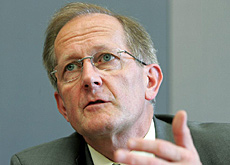Senate washes its hands of “genocide” question

Turkey's massacre of Armenians in 1915 will never be an issue for the Swiss Senate, according to the president of the Senate foreign-affairs committee.
Peter Briner said other countries had no business pointing the finger at Turkey 90 years after the disputed events.
Briner said the committee had decided that the death or deportation of 800,000-1.8 million Armenians between 1915 and 1919 would not be the subject of a plenary session.
He said the committee agreed with the government that it was not parliament’s job to decide whether the killings constituted genocide. They have been recognised as such by the parliaments of several countries including France, Russia and Italy.
The Swiss House of Representatives recognised the genocide in 2003. The Swiss government, however, does not officially speak of “genocide” but of “mass deportation” and “massacre”.
Briner said the committee believed that it was up to the parties involved, namely Turkey and Armenia, to reach an agreement.
Disagree to disagree
Briner said a commission of historians had to “work through the terrible events” – just as Switzerland had reappraised its history during the Second World War.
Attempts by international scholars to determine once and for all what really happened between 1915 and 1919 have never got much further than agreeing which two countries were involved.
In May a group of Turkish historians had to cancel a conference debating the genocide after the Turkish justice minister accused them of “stabbing Turkey in the back”.
In June Alev Kiliç, the Turkish ambassador to Bern, told swissinfo that during Foreign Minister Micheline Calmy-Rey’s visit to Turkey in March, the Turkish foreign minister Abdullah Gül talked about establishing a commission of historians from both sides and opening all files and archives.
“But of course the proposal has also been made to the Armenian government and we can’t establish anything without their agreement. We have still not received a positive reply,” said Kiliç.
Sabre-rattling
A week is a long time in Swiss-Turkish politics, but diplomatic relations need some serious resuscitation after a miserable ten days for the two countries.
At the end of July the Swiss ambassador to Ankara had to deflect a barrage of diplomatic flak concerning the Swiss investigation of a Turkish politician who had proffered revisionist views about the Armenian genocide in 1915.
Then on August 5 the Turkish authorities postponed indefinitely a visit to Turkey in September by Swiss Economics Minister Joseph Deiss, citing agenda problems of his Turkish counterpart.
Few in Switzerland believe an inability to use a diary was the reason for the cancellation.
“That’s a typical diplomatic excuse if you can’t think of a better one,” said Briner.
“The important thing is that we now show some guts,” he said. “I get the impression that the Turkish government wants to placate its people with this sabre-rattling.”
swissinfo with agencies
The historical interpretation of the deaths or deportations of between 800,000 and 1.8 million Armenians between 1915 and 1919 has caused tensions between Turkey and many European countries.
The killings have been recognised as genocide by the parliaments of several countries, including France, Russia and Italy.
The UN recognised it in 1985, two years after the European Parliament.
The Swiss House of Representatives followed suit in 2003.
The Swiss government does not officially speak of “genocide”, but of “mass deportation” and “massacre”.

In compliance with the JTI standards
More: SWI swissinfo.ch certified by the Journalism Trust Initiative












You can find an overview of ongoing debates with our journalists here . Please join us!
If you want to start a conversation about a topic raised in this article or want to report factual errors, email us at english@swissinfo.ch.